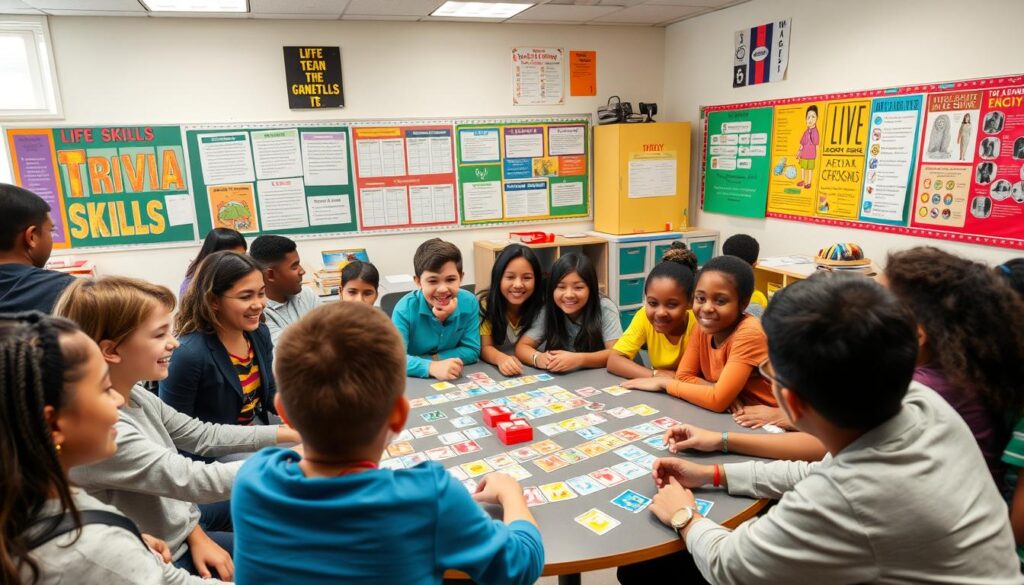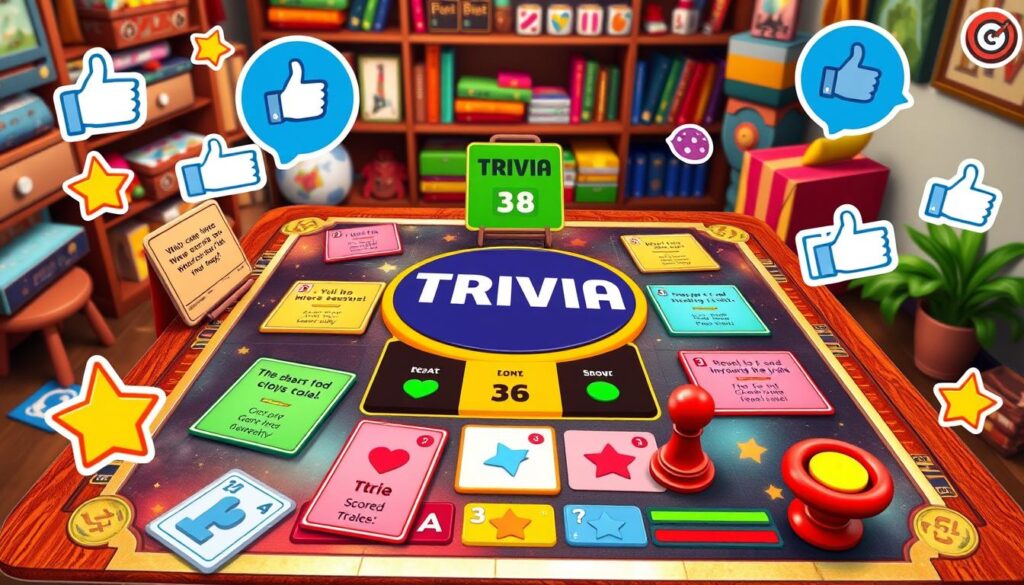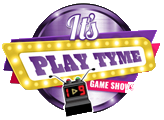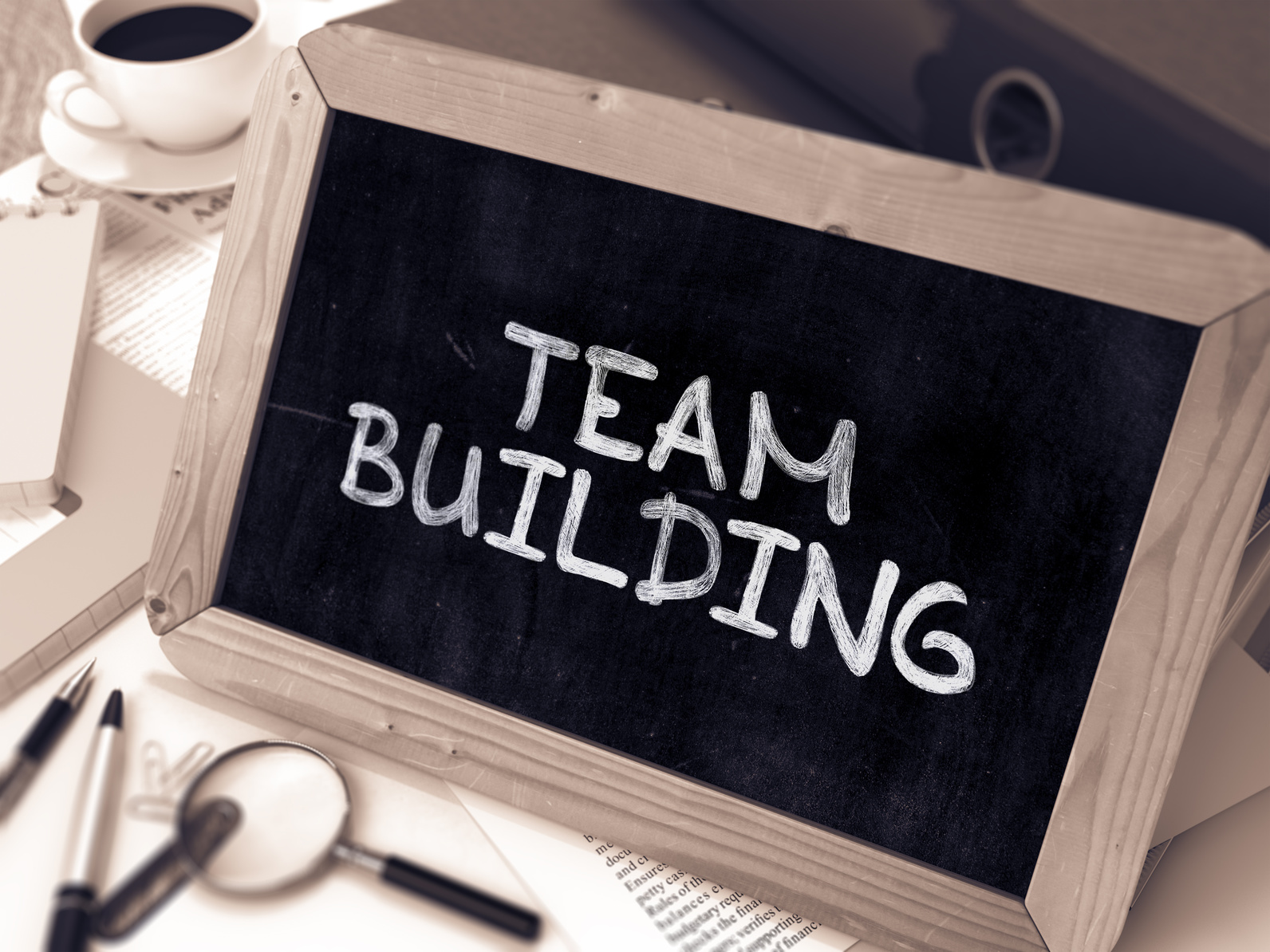Imagine a group of middle to high school students, all eyes on their screens. They’re not bored; they’re actually excited. They’re playing a trivia game that’s both fun and educational. It’s a way for schools to promote teamwork and personal growth.
Games like those on TriviaMaker and Crowdpurr are more than just games. They’re about learning life skills and building character. Players can work in teams or go solo, all while improving their emotional intelligence and decision-making.
These trivia games ask questions that mirror real-life situations. They’re not just for fun. They’re tools to help people grow and become more self-aware. By playing, individuals can become better versions of themselves, both personally and professionally.
Key Takeaways
- Customized character-building trivia turns school assemblies into fun, learning experiences.
- Educators can use trivia games to boost teamwork and personal growth.
- Games like TriviaMaker and Crowdpurr teach life skills and emotional intelligence through real-life scenarios.
- These activities improve important skills like communication and problem-solving.
- Trivia games are both entertaining and practical for character development and a growth mindset.
Introduction to Character Building Trivia
Adding character-building trivia to a school assembly as learning activities highlights the importance of character-building. It helps people grow strong and make good choices. Trivia makes learning fun and memorable.
Why Character Building is Important
Building character helps people deal with life’s tough times with courage and a clear moral compass.
It teaches them to be responsible, empathetic, and never give up. The educational trivia method helps by encouraging deep thinking and discussions.
- Helps in navigating life’s challenges with resilience
- Encourages ethical decision-making
- Builds confidence and empathy
- Enhances communication skills and multi-perspective understanding
Benefits of Using Trivia for Learning
Trivia games in learning offer many benefits. They make learning fun and interactive, with quick feedback.
These benefits of trivia games include boosting self-confidence, teaching empathy, and improving communication. They also help understand different views and challenge biases, key for growing well-rounded.
“Trivia games are an excellent tool for educational engagement; they increase interaction and make learning fun and impactful.” – Unknown
The Ultimate Character Questionnaire and Worksheet has over 150 questions. It covers personal details, values, and daily life. This shows the importance of character building and offers a deep dive into character understanding.
Interactive trivia uses real-life examples, making learning relevant and useful. Companies that use quizzes see a 31% increase in customer loyalty. This shows how engaging quizzes can be.
| Trivia Game Benefits | Impact |
|---|---|
| Boosts Self-Confidence | +20% |
| Fosters Empathy | +15% |
| Enhances Communication Skills | +25% |
| Debunks Personal Assumptions | +30% |
In summary, using trivia in character building is a great way to learn. It’s fun and effective. It helps educators and trainers create a positive, interactive space. This space helps grow well-rounded individuals. For more on the benefits of trivia games, check out this link.
What is Customized Character Building Trivia?
Customized character-building trivia is a new twist on traditional trivia games. It tailors questions and scenarios to fit the unique needs of each participant. This makes learning fun and ensures the lessons are useful in real life.
By focusing on personalized trivia games, people can explore their character development in meaningful ways. They get to face scenarios that really matter to them.
Definition and Overview
Customized character-building trivia creates questions and challenges that meet the personal needs of each player. It adapts to the interests, values, and goals of its participants. For example, Meiro’s AI quiz builders help educators create tailored learning experiences in under 3 minutes.
Meiro offers unlimited features, including quiz creation and lead tracking. This makes it a top choice for those seeking comprehensive, customized trivia experiences.
Platforms like Outgrow and Riddle also offer extensive customizations. They include features like conditional logic and lead tagging to boost user engagement and personalized learning. These tools ensure every trivia game is engaging and relevant to its audience.
How Customization Enhances Learning
Customization in character-building trivia aligns learning with each participant’s unique context and skill level. It creates a more immersive learning environment that encourages deeper reflection and personal insight. For instance, Woorise’s pre-built templates and interactive campaigns are designed to engage users and drive meaningful learning outcomes.
This method makes learning more enjoyable and effective. A customized trivia game can cover various subjects like Math, Science, English, and Social Studies. It’s a versatile tool for educators. Plus, it integrates real-life challenges and scenarios, helping participants apply what they learn and solidify their understanding.
| Platform | Key Features | Audience Capacity |
|---|---|---|
| Meiro | AI-powered quiz builder, unlimited features | Up to 350 in-person, 300+ online |
| Outgrow | Conditional logic, 1,000+ templates | Varies by use case |
| Woorise | Pre-built templates, lead generation | N/A |
| Riddle | Interactive content, unlimited plans | High traffic viable |
| Interact | 800+ templates, URL-based quiz creation | Limited in entry-level plan |
Interactive Character Development Through Trivia
Engaging learning games based on trivia help people think critically and make decisions.
These games reflect real-life situations. This hands-on method makes learning stick by showing how theory works in practice.
Engaging Questions and Scenarios
Trivia games ask tough questions that make you think deeply. They use real-life scenarios to make learning feel real. This way, you don’t just learn; you understand how it applies to you and society.
- 9 free online personality quizzes are available for character development.
- The 16 Personalities quiz assesses five basic personality traits based on the Myers-Briggs system.
- The DISC test categorizes personalities across four traits: dominance, influence, steadiness, and conscientiousness.
- The Big Five Test evaluates characters on five-trait personality models: extraversion, agreeableness, openness, conscientiousness, and neuroticism.
- The Enneagram identifies within nine distinct personality types.
- The Color Test requires participants to choose colors, providing intuitive insights into extroversion or introversion.
- Visual DNA encourages decision-making through appealing images.
- Love Languages determine relational dynamics based on preference.
Ensuring Relevance to Real-Life Situations
Using real-life scenarios in learning games is key. It makes the questions and challenges feel real and connected to your life. This approach makes learning meaningful and memorable.
81% of managers say quizzes grab attention. And 69% of marketers find them very effective in the buyer’s journey.
Top Fun Games for Character Building
Adding fun character games to daily routines can be both fun and educational. Games like The AND Game Self Love Edition, Head Rush for quick self-reflection, and The Ultimate CBT Game help improve character in people of all ages.
The AND Game Self Love Edition
The AND Game Self Love Edition boosts self-awareness and care. It asks players to share personal stories and reflect on their character. This game helps players understand themselves better and feel empathy for others.
Head Rush for Quick Self-Reflection
Head Rush is a fast-paced game that encourages quick self-reflection. It’s great for groups of 4-6, keeping everyone engaged. This game is perfect for those who want to quickly understand their thoughts and behaviors.
The Ultimate CBT Game
The Ultimate CBT Game focuses on Cognitive Behavioral Therapy (CBT). It helps players recognize and challenge their negative thoughts in a fun way.
Playing this game in groups can be very helpful, as players support each other’s growth. It teaches emotional intelligence and practical skills for dealing with life’s challenges.
These games help with self-discovery and emotional intelligence. They make learning fun and help people grow personally and interpersonally. Adding fun character games to learning can make it more engaging and effective.
Adapting Classic Games for Self-Awareness and Growth
Turning classic games into tools for personal growth is a fresh way to mix fun with learning. People find a fun spin on old favorites by adding adapted classic games to self-improvement plans. This makes it easier to get involved and learn.
For instance, adding personal reflection questions to Jenga makes players think deeply after each move. Also, adding character challenges to checkers turns a simple game into a deep dive into self-awareness and problem-solving. These self-awareness games are great because they make learning fun and part of everyday life.
Here are some examples of how adaptations can be effective:
- Self-Awareness Growth: Only 10-15% of people are self-aware, which affects their decisions and happiness.
- Experiential Learning: Seymour Epstein’s cognitive experiential self-theory (CEST) shows that learning through experience sticks better than passive learning.
- Enhanced Participation: Studies show that 70% of adults learn better when games are used along with traditional teaching methods.
- Skill Application: Training games can boost skill use after training by 30%. They provide a safe space to practice new skills.
Adapting games for personal growth makes learning exciting and accessible. It uses the common love for traditional games. These personal growth games help people on their journey to self-discovery.
| Game | Adaptation | Benefit |
|---|---|---|
| Jenga | Add reflection questions on each block | Fosters introspection and self-awareness |
| Checkers | Infuse character challenges | Enhances problem-solving skills |
| Scavenger Hunt | Emphasize exploration and teamwork | Develops critical thinking and collaboration |
| Two Truths and a Lie | Encourage personal revelations | Boosts communication and engagement |
Personalized Trivia Quizzes for Life Skills
Personalized character quizzes are a great tool for self-improvement. They ask questions that match your life and challenges.
This helps you find your strengths and see where you can get better, leading to a better you.
Creating Personalized Questions
Making personalized quizzes means asking questions that fit your life and goals. For example, asking about your daily choices, how you feel, and how you interact with others makes the quiz more meaningful.
Kahoot! has over 100 million quizzes ready to play, making it easy to customize. Sites like Water Cooler Trivia also offer tailored quizzes, making your experience even more personal.
| Subscription Plan | Monthly Cost | Participants per Session |
|---|---|---|
| Basic Plan | $3.99 | Up to 25 |
| $12.99 Plan | $12.99 | Up to 50 |
| $20.99 Plan | $20.99 | Up to 100 |
| Premium Plan | Custom Pricing | Up to 400 |
Kahoot! has different plans starting at $3.99 a month. Each plan offers unique features for different group sizes. You can even get content from Disney and Marvel, making your quizzes more fun and engaging.
Assessing Personal Development Through Trivia
Taking these quizzes regularly helps you see how you’re growing. Questions about making decisions, solving problems, and thinking creatively show your progress. This way, you can keep improving and getting better at life skills.
These quizzes let you see real changes in your life and work. They show how important it is to have quizzes that fit you perfectly.
Utilizing Technology in Character-Building Games
Technology has made character-building games more accessible and appealing. It brings in digital tools and platforms to improve learning. Apps and online platforms offer interactive, customizable interfaces for individual or group needs.
These tools help track progress, revisit challenging scenarios, and get instant guidance. This digital approach supports learning at your own pace, remotely, or in groups.
Apps and Online Platforms
Many character-building apps and online platforms have appeared with digital education’s growth. They offer a wealth of resources for both educators and learners. These platforms make learning dynamic and engaging by adding gamified elements like points and rewards.
Studies show digital educational games positively impact motivation and engagement. They create immersive, challenging environments that boost learning.
Digital Tools for Interactive Learning
Digital education tools are key in interactive learning. They use innovative techniques to engage students. Immediate rewards and a sense of achievement motivate students greatly.
These platforms apply social cognition and behaviorist theories to boost motivation. The US Department of Education supports personalized learning through digital means. This allows educators to meet individual needs in diverse settings.
Tech-enabled character-building goes beyond traditional subjects. It includes language, math, science, and humanities. Digital tools make learning fun and enjoyable, fostering a positive attitude.
Gamification also supports community connections, encouraging autonomous learning. This improves educational efficiency overall.
Strategies for Effective Implementation
To make character-building trivia games work, they need to be part of daily life. This means adding them to regular school activities.
It’s a method that many schools around the world use, like in the United States, Taiwan, Sweden, and Turkey.
Integrating Games into Daily Routines
Adding games to the classroom makes learning fun and real. Teachers should include trivia games in their plans. For example, they can use short questions during breaks to teach important values like honesty and tolerance.
A study in Indonesia showed that schools need a clear plan for teaching character. The Curriculum 2013 supports this by focusing on both learning and personal growth.
Encouraging Participation and Engagement
Getting students involved is key to making character-building work. Teachers can offer rewards, hold reflection sessions, and ask for feedback. For instance, using surveys and personality tests can help students see their progress.
Also, making students feel valued and recognized helps them want to join in. This approach has shown to improve both school performance and social skills.
| Character Component | Implementation Strategy |
|---|---|
| Honesty | Incorporate daily trivia questions about moral dilemmas. |
| Curiosity | Introduce weekly challenge quizzes that explore unknown facts and encourage inquiry. |
| Responsibility | Design role-playing scenarios where students must make decisions and reflect on outcomes. |
| Creativity | Encourage students to create and share their own trivia questions. |
Using games to teach character is a smart way to keep students interested. It makes learning fun and helps them grow important life skills. By planning carefully and making the classroom interactive, teachers can make a big difference.
Case Studies: Successful Application of Trivia Games
Looking into case studies on trivia games shows how they boost learning and teamwork. They help educators, trainers, and companies see the value of trivia games.
Testimonials from Educators and Trainers
Educators often say that trivia games make students more engaged. A study found that team trivia games can raise student engagement by up to 50%. This leads to better teamwork and communication.
Real-life examples show that trivia games help students remember things better. Students who played trivia games retained information 30% better than those who didn’t. Teachers also saw more interaction and a willingness to learn harder topics.
Examples from Real-Life Applications
Trivia games aren’t just for school. In the workplace, over 80% of remote workers say trivia games make them feel more connected. These studies show that trivia games improve teamwork and communication, with a 32% boost in virtual events.

Schools that host family fun trivia nights see a 25% jump in engaged students. About 67% of schools with team-building activities, like trivia, have happier kids. Plus, offering prizes for winners can increase participation by 45%.
These examples show how well-designed trivia games can connect people and improve performance.
Here’s a summary of these statistics:
| Statistic | Impact |
|---|---|
| 80% of middle school students | Boost in team morale and engagement |
| 32% increase | Improved team collaboration and communication |
| 78% of participants | Felt more connected to their team |
| 67% of companies | Higher employee satisfaction |
| 25% increase | Higher employee productivity |
| 45% increase | More engagement with prize incentives |
| 63% of participants | Positive organizational culture |
| 36% improvement | Better knowledge retention |
| 50% increase | Enhanced student engagement |
| 30% increase | Higher retention rates in students |
By looking at case studies, testimonials, and real-life examples, we see how trivia games change things.
They help in learning and teamwork in schools and workplaces. This shows their power to grow, learn, and work together in different places.
Customized Character Building Trivia for Different Age Groups
Character-building trivia isn’t for everyone. It’s important to make it fit different ages and levels of maturity. For kids, games might teach basic social skills and decision-making. For teens and adults, they might tackle more complex topics like self-reflection and life skills.
By adjusting the content, each group gets a learning experience that’s right for them. This ensures everyone gets the most out of the games.
Tailoring Questions for Children
Children love age-specific trivia games with simple, fun questions. These games teach them about sharing, empathy, and solving problems. They’re short, lasting 5-10 minutes, to keep kids engaged.
Games like PSYCH! let kids pick categories that keep them interested. Using educational games for all ages with fun visuals helps young minds learn better.
Adjustments for Teenagers and Adults
Teenagers and adults need more challenging educational games for all ages. Teens might enjoy quizzes that help them discover themselves, like QuizBreaker. It promotes sharing knowledge and teamwork.
Games like Trivia Crack offer a competitive twist with six categories. They appeal to a wide range of interests. For teens and older adults, games should have more depth and real-life examples.
Adults need trivia that pushes them to think deeply and reflect. Games like Travel Trivia and CrowdPurr offer customizable questions. They keep adults engaged. Research shows quizzes for older adults (over 50) are very effective, with a 55% retention rate.
DIY Customized Trivia: Tips and Ideas
Making your own trivia games is a fun way to share family values. It makes sure everyone has a good time and learns something new. Here are some tips and ideas to help you get started:
Create Your Own Trivia Questions
When making trivia questions, keep them clear and fun. Start by making each question under 250 characters. Also, keep the multiple-choice options under 100 characters.
Use interesting facts that are short and sweet. You can also add visuals or sounds to make it more engaging. Here are some more tips:
- Mix question difficulties: This keeps everyone involved, boosting engagement by up to 70%.
- Format for simplicity: Choose questions with clear answers and simple responses.
- Incorporate multimedia: Add .mp3 and .mp4 files under 5MB for a richer experience.
- Theme-based questions: Make questions fit special occasions like birthdays and anniversaries.
Incorporating Family and Social Values
Adding family and social values to your games creates a supportive atmosphere. Here’s how to make your trivia games reflect these values:
- Focus on shared experiences: Ask questions about family milestones and cultural heritage to bond everyone.
- Encourage teamwork: Design the game to encourage working together, improving family interactions.
- Highlight life lessons: Use trivia to teach lessons on kindness and integrity through real-life scenarios.
- Diverse topics: Include categories like civil rights and environmental conservation to broaden awareness.
Creating DIY trivia games that focus on family values can unite and educate your group. It makes for a more engaging and informed experience.
Feedback and Assessment in Trivia Games
Feedback and assessment are key in trivia games, mainly for learning. Using game feedback mechanisms and assessing educational games helps teachers see how students are doing. This helps them make the content better.
Evaluating Progress and Growth
Teachers use numbers to check how students are doing. They look at the average score, which shows how well students are doing overall. They also check the lowest and highest scores to see how students are doing in different ways.
They use the mean score to find the average of all scores. The median score helps them understand the middle score. This gives a clear picture of how students are doing.
- Standard Deviation: Shows how spread out the scores are from the average.
- Percent Correct: Shows how many students got every question right.
- Difficulty Ranking: Ranks questions by how hard they are, with 1 being the hardest.

Using Feedback to Improve Game Dynamics
After getting feedback, teachers can make the games better. They can change the questions, how the game works, and how fun it is. They look at how well students do on each question to see what needs work.
Tools like Tutor LMS’s “Quiz Builder” help make the games more fun and focused. They offer different types of questions to keep students interested.
Using data to find patterns helps teachers make the games better. Bar charts show how students did on each question. This helps teachers see what needs to be changed.
Using different modes like default, reveal, and retry helps give feedback that matters. It also lets students practice more. Keeping an open line for feedback helps make the games better over time.
Adding feedback to games makes them better for learning. It’s important to check if games are helping students learn. This way, games can help students grow and learn in a fun way.
Conclusion
Customized trivia games are key in teaching important life skills. They make learning fun and help people think critically and understand themselves better. These skills are vital for personal growth.
These games also have a big impact on learning. They let people try different scenarios and make choices like in real life. This keeps players interested and wanting to get better.
Studies show that making games personal boosts engagement by 60%. This shows how important it is to let players customize their games. It makes learning more fun and keeps people coming back for more.
Getting feedback from users is crucial for making these games better. By listening to what players want, developers can make games that are both educational and fun. Today, 74% of players like games that let them show their own style.
In short, customized trivia games are great for helping people grow. They make learning fun and help build strong, adaptable individuals. These games are essential for success in many areas of life.









